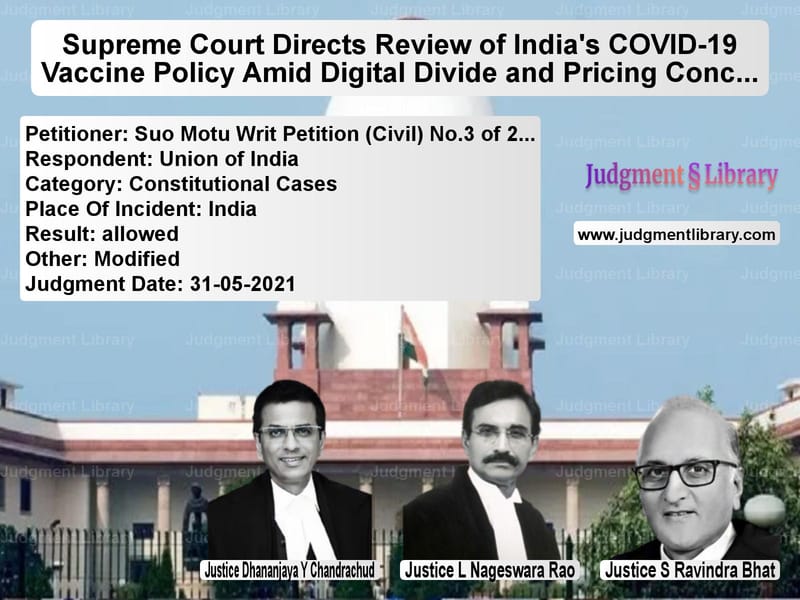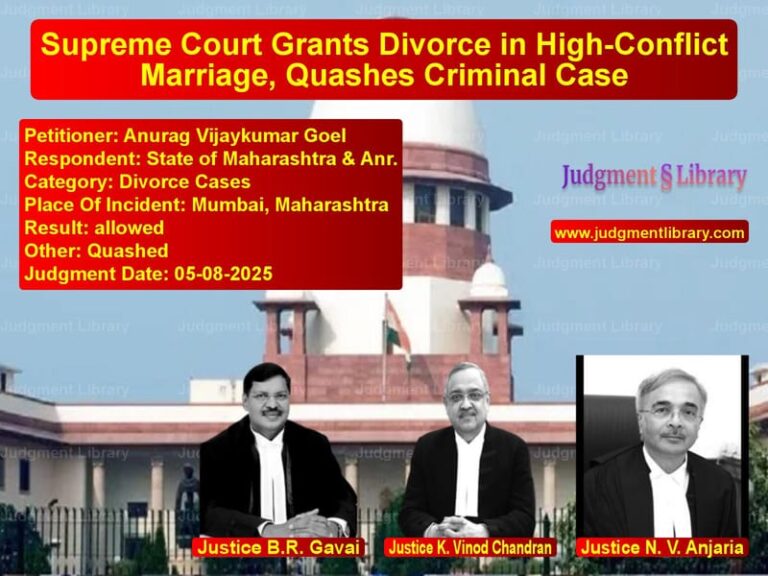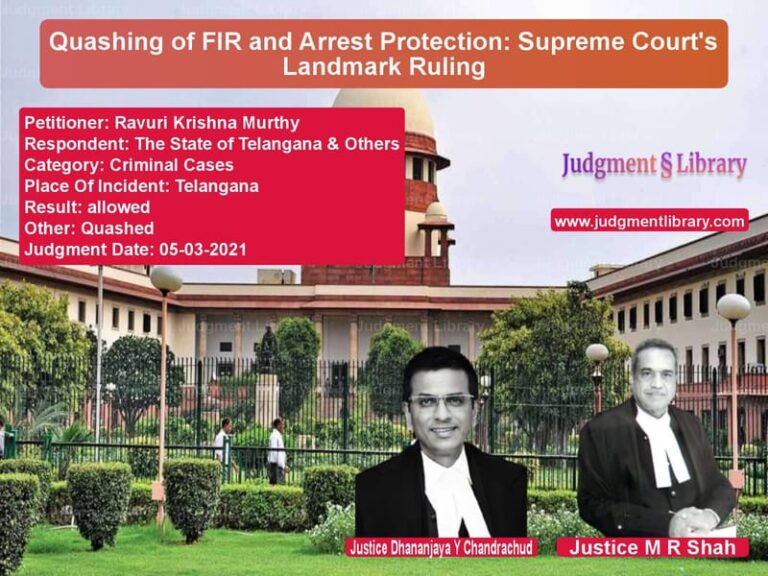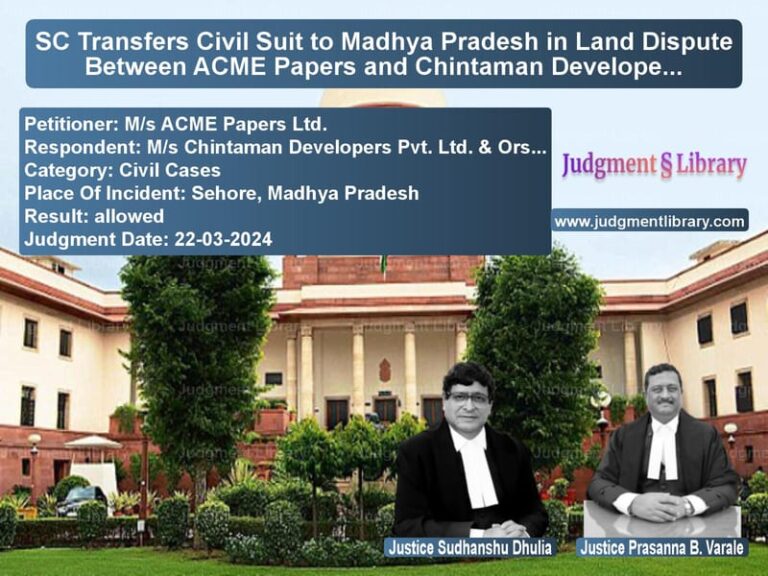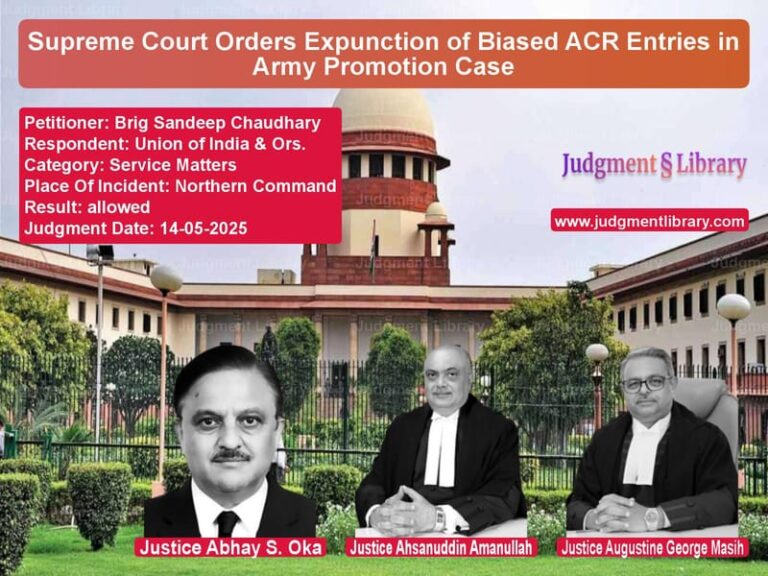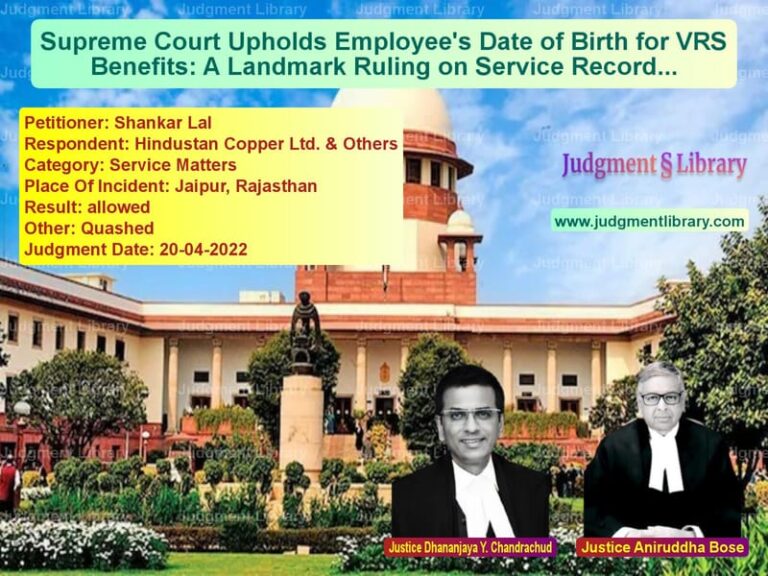Supreme Court Directs Review of India’s COVID-19 Vaccine Policy Amid Digital Divide and Pricing Concerns
The Supreme Court of India has issued a significant order in a suo motu writ petition concerning the distribution of essential supplies and services during the COVID-19 pandemic. The judgment, delivered on May 31, 2021, scrutinizes the Union of India’s (UoI) vaccination policy, addressing critical issues such as vaccine pricing, accessibility, digital barriers, and state versus central government responsibilities.
Background of the Case
In response to the devastating second wave of COVID-19, the Supreme Court took suo motu cognizance of the situation on April 22, 2021. The hearings addressed concerns regarding vaccine distribution, essential medical supplies, healthcare infrastructure, and freedom of speech during the pandemic.
On April 30, 2021, the Court directed the Union Government to reconsider its vaccine policy, ensuring equitable access to vaccines for all citizens. The May 31 ruling builds on these observations, emphasizing the need for transparency, fairness, and inclusivity in vaccination efforts.
Arguments by the Union of India
The Union Government defended its vaccination strategy, stating:
- The national vaccination drive would be completed by December 2021.
- Negotiations with foreign vaccine manufacturers were ongoing to ensure adequate supply.
- There would be no competition among states for vaccines.
- Vaccination for individuals above 45 years of age would continue through walk-in registrations.
Concerns Raised by the Amicus Curiae
The Court-appointed amici curiae raised several concerns about the Liberalized Vaccination Policy, which took effect on May 1, 2021. These concerns included:
- Foreign vaccine manufacturers prefer dealing with national governments rather than individual states, making it difficult for states to procure vaccines.
- Historically, India’s Universal Immunization Programme involved central procurement and free distribution. The shift to decentralized procurement created disparities.
- Vaccine pricing varied, with the central government paying Rs 150 per dose, while states had to pay Rs 300–400 per dose.
- The Liberalized Vaccination Policy placed a financial burden on individuals aged 18–44, especially those from economically weaker sections.
- The lack of clear prioritization for vulnerable groups in the 18–44 age category.
- The digital divide posed a significant barrier to vaccine access, as online registration via CoWIN was mandatory for individuals aged 18–44.
Supreme Court’s Observations and Directives
1. Inequality in Vaccine Procurement
The Court noted that the Liberalized Vaccination Policy placed an undue financial burden on states and individuals. It questioned why the central government, which had secured lower vaccine prices, could not procure all vaccines and distribute them equitably.
2. Impact of Private Hospital Involvement
The judgment raised concerns about private hospitals being allocated 25% of the total vaccine supply. It questioned whether this allocation was justified and whether it disproportionately benefited urban populations while rural areas struggled with vaccine availability.
3. Transparency in Pricing and Procurement
The Court directed the Union Government to disclose:
- The dates and quantities of vaccine procurement orders.
- The rationale behind differential pricing for the central and state governments.
- A roadmap detailing vaccine availability projections until December 2021.
4. Digital Divide and Access Issues
The Court criticized the mandatory online registration requirement, stating that it excluded large segments of the rural population. It directed the government to:
- Enable on-site registration for individuals aged 18–44.
- Ensure the CoWIN platform and other IT applications were accessible in regional languages.
- Conduct a disability audit of the CoWIN website to ensure accessibility for persons with disabilities.
5. Vaccine Distribution and Cold Storage Management
The Court questioned the central government’s approach to vaccine distribution, particularly the lack of clarity on the allocation formula. It sought details on how vaccine cold storage facilities were being managed and expanded.
6. Protection of Crematorium Workers
Recognizing the high-risk exposure of crematorium workers, the Court directed the government to ensure that they were prioritized for vaccination.
Final Directives
The Supreme Court ordered the Union Government to file an affidavit within two weeks, providing:
- Detailed projections of vaccine availability and procurement plans.
- A response on whether states could procure vaccines from foreign manufacturers.
- A policy framework ensuring equitable vaccine distribution across urban and rural areas.
- A plan to address concerns related to the digital divide and vaccine registration.
Conclusion
The Supreme Court’s judgment is a landmark ruling that underscores the importance of equity, transparency, and accessibility in India’s vaccination policy. By directing the Union Government to reconsider its approach, the Court has reinforced the constitutional principles of fairness and equal protection under the law. The coming weeks will determine how the government responds to these directives and whether the vaccination policy will be revised to address the highlighted concerns.
Petitioner Name: Suo Motu Writ Petition (Civil) No.3 of 2021.Respondent Name: Union of India.Judgment By: Justice Dhananjaya Y Chandrachud, Justice L Nageswara Rao, Justice S Ravindra Bhat.Place Of Incident: India.Judgment Date: 31-05-2021.
Don’t miss out on the full details! Download the complete judgment in PDF format below and gain valuable insights instantly!
Download Judgment: suo-motu-writ-petiti-vs-union-of-india-supreme-court-of-india-judgment-dated-31-05-2021.pdf
Directly Download Judgment: Directly download this Judgment
See all petitions in Fundamental Rights
See all petitions in Public Interest Litigation
See all petitions in Judgment by Dhananjaya Y Chandrachud
See all petitions in Judgment by L. Nageswara Rao
See all petitions in Judgment by S Ravindra Bhat
See all petitions in allowed
See all petitions in Modified
See all petitions in supreme court of India judgments May 2021
See all petitions in 2021 judgments
See all posts in Constitutional Cases Category
See all allowed petitions in Constitutional Cases Category
See all Dismissed petitions in Constitutional Cases Category
See all partially allowed petitions in Constitutional Cases Category

